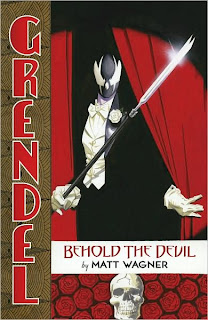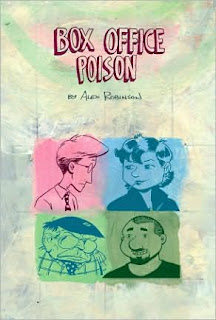 The Boys
The Boys is a foul, unpleasant and deeply derivative comic that masquerades as a foul, unpleasant and ground-breaking comic, which only makes it that much more tedious and dull. This volume -- which I read primarily because I discovered my country library system had a copy of it, and I can't resist a free look at a car-wreck -- collects the first six issues of the series, written by Garth Ennis and illustrated by Darick Robertson, under the volume title
The Name of the Game.
That "game" is superheroism, of course, which Ennis affects a deep disdain of. The heroes of this faux-nihilistic paean to justified ultra-violence hate superheroes -- flamboyant, corrupt, casually destructive self-aggrandizing creeps that they are -- and make it their mission to "keep an eye on" (i.e., engage in spying on behalf of the CIA) and "keep in line" (i.e., threaten, cajole, and occasionally assassinate) those superheroes. Their CIA leash is so long as to be nonexistent, and their relationship to the CIA proper is so unbelievable that it can only be justified by repeatedly remarking that
The Boys is a comic book. Ennis clearly wanted to write a story about bad superheroes and the people who keep them in line, but, at every step of the way and in every tiny detail of his world, he falls back on the dullest, most obvious tropes and presses a meaty thumb heavily on the largest, stupidest, and most over-used buttons imaginable.
For example, this team of five -- you can see them all posing ominously, in the manner of the poster to some particularly empty-headed summer action movie, on the cover to the left -- includes not one but
two generic ultra-violent sociopaths, both oh-so-ironically slight and seemingly harmless -- Ennis must know how derivative and cliched he's being here, since he names them merely The Frenchman and The Female -- who turn into whirling dervishes of death and destruction whenever threatened or Ennis thinks it would be blackly comic. A third is the obligatory Smart Black Guy In Sunglasses Who Plays By The Rules (and Has To Be Convinced To Come Back In Once He's Gotten Out), whose name of "Mother's Milk" would be intriguing if there were any reason to care about him or any other member of the cast. Then there's the hyper-verbal team leader, Billy Butcher, who explains the stupidities of the plot in ways that are meant to be amusing and has a purely-sexual relationship with his female CIA "boss" that appears to have been taken directly out of the fevered fantasies of a particularly dim and unimaginative virgin boy of thirteen.
Last and least of the five is our viewpoint character, Wee Hughie, a regular Scottish guy who was dragged into this world when a superhero-fight accident (compounded by arrogance and a lackadaisical attitude on the part of the superhero) killed his girlfriend. He's reluctant at first, but -- once he learns of the true depravity of superheroes -- he agrees to fight the good fight.
That true depravity, at least as we see it here, is just as dull and unimaginative as every other aspect of
The Boys. Superheroes...have sex! With each other, and with...with...with
common whores! Some of them even have deviant
homosexual sex! They engage in sexual harassment and the demanding of sexual favors! Oh, I'm having an attack of the vapors just thinking of it! Ennis has Butcher's dialogue feint in the direction of political considerations of superhero powers, but the only unsavory acts he actually wrote into the script revolve entirely around sex -- and those are all essentially consensual. One begins to wonder if the real issue "The Boys" have with superheroes is just that the latter are getting more action than the former.
Now, it's time for a quiz. What would you call a small group of people who battle what they see as evil secretly, using their superhuman abilities to do so? Would they be, perhaps, a
superhero team? That's precisely what "the Boys" are, since, in a plot twist of surprising ineptitude and tone-deafness, Ennis makes his heroes
superpowered. Superpowers, we learn halfway through this book, are the result of a simple drug, and of course "the Boys" get that drug -- which in the potent version they receive, only requires one dose to power them up for the rest of their lives -- so that they can engage in punchfests with the gaudily-dressed crowd as necessary.
In a wink Ennis negates the tiny shred of moral superiority he's tried to build up around "the Boys." Sure, we might have thought, these guys are sociopaths who make their own rules and work entirely outside the rule of law, but at least they're regular people fighting back against powerful enemies. Well, not so much. They're actually the manifestation of the current state of the superhero art: once, costumed loonies won because they were smarter, cleverer, or just morally
better than their evil counterparts, and then the trend moved on in favor of long-underwear types who were victorious because they were tougher, more resilient -- who just wouldn't give up -- until, finally, the superhero genre reached its recent nadir with the ascent of the "hero" who is just plain nastier, crueler, and more violent than anyone else. And this "the Boys" are: we see no sign that they'd have any trouble in battle with other superpowered folks in quantities lower than triple digits.
So "the Boys" are not underdogs, as we see in their battle at the end of this book. They're coldly efficient superpowered death machines, different from the brightly-colored supers they loathe only in their far-more-fashionable black leather clothes. And they're entirely capable of murdering other supers casually, which begs the question of why they don't do so more regularly.
Actually,
The Boys begs a lot of questions. The background makes very little sense, particularly if one begins to ruminate about what governments are most likely to do if they have access to a foolproof make-a-superhero potion, and have had one for decades. Ennis, of course, isn't interested in plausibility or reasonability, though; he just wanted to tell a story in which guys in black leather (who are
not superheroes, no no no!) beat the hell out of a bunch of costumed teenagers.
The Boys is equally shot through with unintentional irony, mostly to do with Wee Hughie. Butcher, as part of his ongoing sweet-talk to get the new guy to join the group, bemoans the lack of training of superheroes and the consequent unnecessary body count that follows them around...as he
gives Hughie superpowers and then fails to train him! Even worse, Hughie is responsible for a death in that big battle, which a writer more attuned to nuance would realize is very parallel to the death of his girlfriend back in the opening pages of
The Boys. Hughie, in a very real way, has become what he wanted to stop -- but there's no sign that Ennis even realizes that, or sees any contradiction in his superpowered superhero-hunters.
I've only scratched the surface of the cliches and stupidities of
The Boys -- I haven't yet mentioned Butcher's origin, which is a particularly Grand Guignol version of Women In Refrigerators with a side order of Idomenus, or the odd sense Ennis gives that only evangelical Christian superheroes are
not corrupt, or the travails of the superheroine Starlight among the sexually rapacious JLA-esque The Seven -- but one can only wade through a sewer for so long until the smell just won't come off your boots again.
So there's just space to note that a world with an ever-increasing number of superpowered people that's most worried about the ones that operate in public, love positive attention, and at least pretend to do good either is remarkably lucky with its problems or was badly thought through by its creator. I know which way I'm voting.
The Boys could have been so much better, if only it hadn't been so convinced of its own badassery and coolness. It hews closely to the "realistic" school of Cinemax soft-porn shot-on-video thrillers, with the inevitable lapses of logic inherent in the form, rather than embracing either a more honest concept of
normal people that try to keep superpowered people in check, or by stepping away from its cool detachment long enough to actually be funny, in the manner of something like
Marshall Law. It's a damn shame; making fun of superheroes deserves to be a lot better than
this.
Book-A-Day 2010: The Epic Index
----------------
Listening to:
The Mendoza Line - Thirty Year Low
via FoxyTunes
 Pearls Sells Out was the fourth treasury-sized collection of Stephan Pastis's syndicated newspaper strip Pearls Before Swine, collecting the strips from 8/7/06 through 2/16/08, and I somehow missed it when it was published last August. (I'm still coming to realize how much of my Book Early Warning mechanisms were formed by sixteen years at the book clubs, and it's still occasionally a surprise to remember that I'm not keeping obsessive track of upcoming books as part of my job any more.) But I found Pearls Sell Out on a shelf in a bookstore a few weeks ago, and just finished it recently.
Pearls Sells Out was the fourth treasury-sized collection of Stephan Pastis's syndicated newspaper strip Pearls Before Swine, collecting the strips from 8/7/06 through 2/16/08, and I somehow missed it when it was published last August. (I'm still coming to realize how much of my Book Early Warning mechanisms were formed by sixteen years at the book clubs, and it's still occasionally a surprise to remember that I'm not keeping obsessive track of upcoming books as part of my job any more.) But I found Pearls Sell Out on a shelf in a bookstore a few weeks ago, and just finished it recently.





















